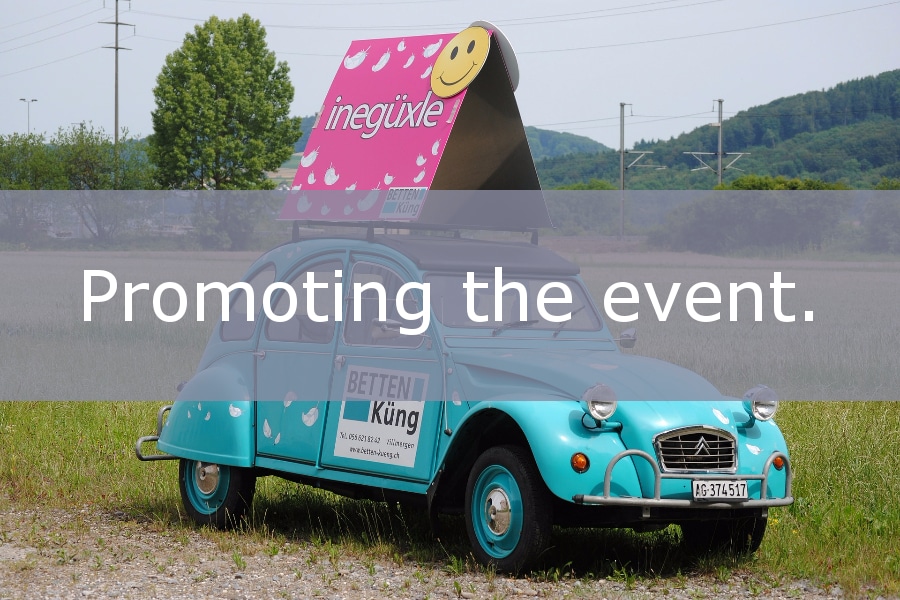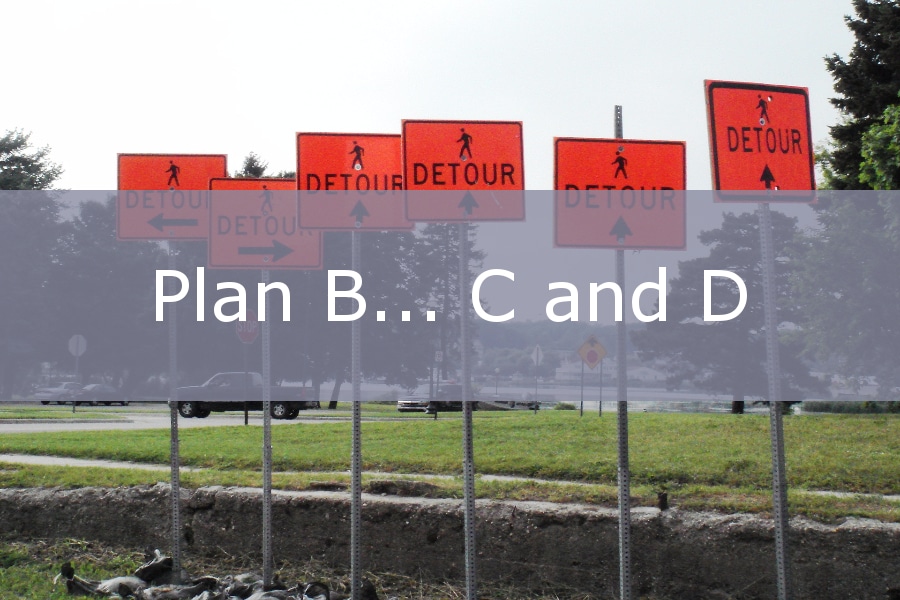
The Event Planning Checklist | 77 Tips for Event Success
Event planning is a job that requires you to wear many, many hats. It involves excellent organizational skills, high attention to detail, resourcefulness, self-reliance, and the ability to manage a team. However, it’s also an incredibly rewarding experience- at the end when everyone’s telling you about the incredible time they had. Unfortunately though, that incredible time is a hard thing to produce.
That’s why I decided to put together this list of event planning tips, in the hopes that it will make things a little easier for all you aspiring (and experienced) event planners. We’re going to cover every step from conception to implementation and evaluation. I’ve broken the list into ten categories that are shown below. Feel free to click on one of them to skip ahead.
Categories
Where to start.
Budgeting for success.
Minding the law.
Designing the venue.
Promoting the event.
Assembling your A-Team.
Successful execution.
Plan B… C, and D.
Evaluate your efforts.
Bonus points.
1. Identify your target audience.
Who is this event for? Are you throwing a corporate dinner with your company’s executives in mind or a product demo for your clients? Take the time to identify your target audience first and that will help steer the rest of your decisions in the right direction.
2. Set measurable goals for your event.
The quickest way to host an event that is viewed as a failure and a waste of revenue is to plan it without setting clear goals. Are you looking to raise brand awareness or generate new leads? Is your goal to nurture customer loyalty or simply to make money? Any goal is fine, just make sure you have one.
3. Specifically, set SMART goals.
Specific, Measurable, Attainable, Relevant, Time-bound… goals. Jen Jamar over at The Events Calendar has an excellent little post on the importance of SMART goals and how to set them.
4. Choose your venue and set your date.
Many, many event planners set their date and go from there… just to find out later that no suitable venue is available at that time. Do yourself a favor and start with the venue, then let everything comfortable fall into place.
5. Figure out your “Drop Dead” date.
Your drop dead date is the last day you can cancel your venue without incurring any costs. This date is important and should constantly be in the back of your mind, just in case.
6. Set a concrete budget.
Failure to set a concrete budget ahead of time is up there on the list of event planning mistakes. Don’t look at your budget as a fluid object that changes with your plan. Instead, look at your budget as the solid container that your plan must fit into.
7. Create your master list.
This list should include EVERYTHING from your decorations and refreshments to the guest list and transportation arrangements. When you start by building one complete master list it gives you a better perspective on how the budget and organization needs to pan out. It will also allow you to simply copy/paste certain aspects as you create more specialized lists and confirmed plans down the road. The less time you have to spend on writing the same information multiple times, the more you can spend on planning a truly epic event.
8. Check out everyone’s calendar – not just your own.
There’s nothing worse than finding out you’ve scheduled your event on the same day as another industry event or a religious holiday. So be sure to double-check that there are no conflicting events scheduled for your desired day.
9. Be flexible – even the best plans will require some changes.
Simply put, until the event happens, nothing is set in stone. The event that you plan out in your first draft may end up looking nothing like the real thing. The event’s location, size, content presented – all of these things may change as the date draws nearer. But, as long as you keep your target audience and goals in sight, things will be fine.
10. Don’t overstep your limits.
Now, obviously one of the main goals behind every event is to throw one that is amazing, memorable, the talk of the town. Unfortunately, budget and time constrictions will limit the lengths you can go to in providing that experience. That’s okay though. You don’t need to throw the largest or most expensive event for it to be a good one. Know your limits and strive to reach them, setting impossible goals for your event is a simple way to guarantee failure.
11. Never stop asking how your plans are related to your guests.
There are so many great options for event content from keynote speakers to games, product demos, and other exclusive offers. The question is, are they relevant to your audience? Knowing what your audience values in advance will keep you from wasting resources on items that you may think are perfect, but aren’t interesting or valuable to your guests.
12. Brand your event.
Come up with a catchy title and tagline for your event. It should be compelling, but still reflect upon your brand’s messaging. Next, create an event specific logo. If possible, make it a modified version of your company’s logo to keep things consistent and improve brand awareness.
For more event branding tips, check out this article we wrote.
Now, I know that we already glossed over the importance of setting a concrete budget, but it really does warrant its own category.
13. Write a detailed budget.
Your budget shouldn’t be a simple list of six categories with their respective dollar amounts jotted down on a notepad. You need to have a detailed list of all expenses and projected income. Don’t leave anything to chance and you won’t be caught off guard by an unexpected expense.
14. Err on the conservative side.
While it would be nice if everything went according to plan and all of the actual numbers reflected their projections, that’s rare- never the case. Err on the conservative side when drawing up your projected budget and those pesky unforeseen expenses won’t turn into a major problem.
15. Stick to it.
This one seems obvious, but it’s amazing how many event planners will draw up an excellent, fiscally sound budget- just to throw it to the wind once it comes time to set everything up. Don’t be one of those people. Make your budget, and stick to it.
16. Shop around.
You can’t know that you’re getting the most bang for your buck if you don’t explore all of your options. Get quotes from as many vendors as possible for all of your supplies because there just might be a better deal lurking in the corner.
17. Don’t hesitate to negotiate prices.
Not everyone is comfortable negotiating terms and prices, but it can lead to some pretty incredible savings. If you’re not cut out for slick negotiations, consider enlisting the help of someone with sales experience.
18. Explore all potential revenue streams.
Every half decent event planner knows to seek out extra revenue from sponsors and that things like tickets or refreshments must be priced accordingly- but, the pros know that there are so many other unique revenue streams just waiting to be tapped. Be sure to look into potential public funding or even crowdsourcing for certain events.
Want to read more? Check out Julius Solaris’ Tips and tricks on Event Budgeting at The Event Manager Blog.
19. Understand your liability.
Sadly, accidents do happen even during what are supposed to be joyful occasions. Plan ahead for such incidents by looking into your venue’s liability policy and creating one of your own. A savvy planner will have any necessary forms on hand because it’s better to be safe than sorry.
20. Don’t forget the liquor license.
To some, this is an obvious step, but to many, it’s the one that they horrifyingly overlooked. There are steep fines for forgetting your liquor license, so make sure it’s one of the first things on your list.
21. I need a permit to play my iPod?
Unfortunately, yes. The songs you purchase via download or on CDs is licensed for personal use only. You’ll need a Public Performance license for any music played at your event. Huh, so there is still a reason to hire a DJ…
22. Know your attendance limit.
All public venues have a legal maximum capacity. Breaching said capacity will prompt a friendly visit from your local fire marshal and the quick end to your event accompanied by a nice fine. Seriously though, overcrowding your venue creates a serious fire hazard which puts the lives of your attendees in danger, and I know you don’t want that.
Phew, thankfully the mind-numbing legal work is over- back to the fun stuff.
23. Use a theme.
You can be unique without making everything from scratch. Choosing a tested theme, whether it be classy luxury cars or a fun 80’s night, will take some of the guesswork out of your decorating choices.
24. Go for reusable signage where possible.
This is especially true for recurring events. Reusable banner stands and signage is the gift that keeps on giving as it’s one less thing to pencil into next year’s budget.
25. Hang detailed agenda posters at the entrance.
Agenda posters placed at the entryway and other key locations will serve dual purposes of informing the guests about what to expect and keeping them occupied while they wait in line.
26. Place directional signs in convenient locations.
Highly visible and well placed directional signage will help keep people flowing smoothly as they make their way into and through the venue. You know how frustrating it is to get lost or be stuck sitting in traffic, so don’t let either of those things happen to your guests.
27. Make a grand entrance.
You know, first impressions are everything. That applies to your event as well. If there’s one area where you should be a little freer with the budget, it’s the entryway. An amazing entrance sets the tone for the event and entices passersby. Unless privacy is one of the necessities of the event, go big or go home.
28. Pay attention to the little things.
A good rule of thumb for life, not just event planning, is that when you take care of the little things, the big things will follow. People notice the little things. Something as simple as a branded napkin with a little word game, poem, or thank-you note can make a lasting impression on your guests.
29. Be mindful of food restrictions.
This is one of those little things that you need to pay attention to. Whether it be allergies or dietary restrictions, chances are that you will have guests who can’t eat everything. Plan ahead for these restrictions by eliminating certain items (peanuts) from your menu and preparing alternative dishes.
30. Ask Google and you shall receive.
Seriously, Google should be the first stop for all of your planning needs. There’s a plethora of information on every aspect of event planning available online. Chances are someone has already had the problem you’re having (or are about to have) and has worked out a solution online.
31. Call in the reinforcements.
Whether you hire a professional designer or simply seek some input from a friend or colleague, it pays to get a fresh set of eyes on your design. When you put so many hours into a design or anything really you can end up with tunnel vision and fail to notice where improvements can be made. A fresh set of eyes will ensure that your design is the best it can be.
Looking for some design inspiration? Check out this article by Sara Elliot at How Stuff Works – Lifestyle.
32. Set marketing goals.
Much like with your event itself, you need to have a clear definition of what successful marketing efforts look like if you hope to achieve them. Your marketing goals will help to directly influence your…
33. Create a promotional calendar and stick to it.
You’ve decided what success will look like. Now it’s time to lay out a schedule that will help you achieve those goals in the most efficient manner. A promotional calendar is a key aspect of a well-organized event plan and will keep you from missing any deadlines while you’re caught up in all the preparation.
34. Your marketing efforts need to be relentless.
The most spectacular, once in a lifetime event won’t have any attendance if it’s not marketed properly. Your attendance will directly reflect the effort you put into inviting people and promoting the event.
35. Identify the number one reason for people to attend.
What are you offering? What is the most compelling reason to come to your event? Why should someone choose to attend your event over the myriad of other things they could be doing with their limited free time? Focus on the benefits of coming to your event, not just the planned content. When you can reach your audience on an emotional level, convincing them to attend will be much easier.
36. Don’t forget the press.
With the boom in social media use it’s easy to forget the traditional methods of advertising. Reach out to people at your local newspaper, radio stations, and of course, bloggers that cover your niche. Offer a ticket to the event and you may just get some free advertising.
37. Incentivise event promotion.
Take your efforts with the press one step further by offering free tickets for their readers. This will give them a reason to promote your event with a little more gusto by offering them a way to generate more audience engagement.
38. Create a dedicated event page on your website.
This tip is especially effective for recurring events. Maintaining a dedicated page will improve your organic search traffic for the event and give attendees a place to share their experiences year round.
39. Make a custom Twitter hashtag.
Twitter is a highly-effective, low-cost method for generating tons of buzz around your event. Be sure to set up a specific handle to organize the event posts and be active. Twitter is all about lots of small interactions, so be sure to check it frequently if you want to get the most from your efforts.
40. Host a pre-event dinner or online event.
A great way to generate buzz and reward your loyal fans and promoters is to host a pre-event dinner or web event where you offer an exclusive preview of the main event. Take this one step further by offering everyone who participates a key that they can redeem for something special at the event. People love mystery prizes- this is a sure-fire way to generate plenty of buzz.
41. Advertise on social media networks.
This won’t be a good option for every event. However, if done right social media advertising can be a very cost-effective way to get your message out to a large and highly targeted audience. Whether or not you should advertise this way all depends on the scale and intent of your event.
42. Post a sneak-peek on YouTube.
They say a picture’s worth a thousand words… so just imagine how many words a video must express. Anyways, it’s an excellent idea to make a short sneak-peek video for YouTube. It will integrate seamlessly with your other social media efforts and help you reach a broader audience. Text ads are great and easy to produce, but one good video is worth its weight in gold when it comes to shares.
43. Make it as simple as possible to register.
This doesn’t just mean offering online registration, this means offering all types of registration. The last thing you want to find out is that your marketing efforts failed because people found it inconvenient to register. If possible, you should accept registration by phone, online through email, your website, or social media, and event by fax… yeah, fax.
44. List your event on… an event listing site.
Websites like Meetup or Lanyrd were designed specifically to allow planners to promote their events, invite, and manage guests. They’re definitely worth checking out while you plan your marketing efforts.
45. Encourage your entertainment to promote the event to their audience.
Whether it be speakers, comedians, musical performers, you name it- encourage them to promote the event and share the experience with their audience. It’s a win/win for brand awareness.
46. Reward your early registrants.
The best way to boost registration early on is to incentivise it. Offer people a reduced rate or even better, access to some type of exclusive content either before or during the event.
For more event promotion tips, check out this article by Sara Gilmer at Events Tag.
47. Look online.
This goes back to Google and you shall receive. Arguably the easiest way to find talented event staff is to look online. Be sure to read through reviews, (specifically the best and worst) and try to find reviews from multiple places if possible.
48. Ask around.
Word of mouth still has its merits in finding valuable and dependable event staff. Ask your colleagues and friends if they know anyone who would suit one of the myriad of roles you’ll need filled. A personal recommendation still trumps any amount of online reviews.
49. Keep your brand image in mind.
Your event staff will be the face of your event and more importantly, your brand. Make sure that the image and values they represent coincide with your brand image. A lack of consistency here can really hurt your attendee’s experience.
50. Provide a detailed summary of the position.
From an employee perspective, there’s nothing worse than getting into work to find out that there’s an entire list of less than enjoyable tasks that were somehow left out in the interview. Put everything on the table when you assemble your team and hopefully, there won’t be any surprises at the event.
51. Delegate tasks effectively.
The better you are at sharing the responsibility the smoother things should run. The trick to delegation though, is aligning people with their strengths. People will naturally perform better when doing a task they’re comfortable with and hopefully enjoy.
52. Keep in touch, but don’t micromanage.
It’s important that you keep the lines of communication with your staff, vendors, and sponsors open- and that you keep track of all the deadlines. You want to discover any issues before they reach a critical state, but you don’t want to give people the feeling that you don’t trust them. Make it clear that you want to be updated at certain times and leave it be until then. You have enough to worry about.
53. Your sponsors are the real VIPs- make sure they know it.
If you have sponsors, chances are your event wouldn’t be taking place without them. Make sure they’re aware of your appreciation by thanking them both at and after the event.
54. That goes for your volunteers as well.
Volunteers are the backbone of many great events. Don’t forget to show them how much they’re appreciated by providing refreshments during the event and genuine, personalized thank you cards afterward.
55. Always underestimate your attendance.
I put this here because of how it applies to the estimates that you provide your sponsors with. However, you should estimate your attendance conservatively in all aspects of your planning. It’s better to get a pleasant surprise once the events over than a glaring disappointment.
56. Employ a dedicated social media team.
The easiest way to guarantee successful social media coverage and exposure for the event is to hire a dedicated person or team of people to handle your accounts. This goes back to delegating effectively- when you let the social media experts focus on that, you can free yourself and the rest of your team up to handle different areas of the event.
57. Be thorough, but don’t wait too long.
Timing is key when it comes to hiring the best event staff. Most are booked weeks or months in advance. So while it’s important to weigh all of your options, don’t take too long or you may end up missing out on the best fit for your position.
58. Set your guest’s expectations properly- then blow them away.
If you did a good job marketing, then your guests should know exactly what they’re in for. Now’s the time to deliver on those promises and go above and beyond. We’re shooting for nothing less than sheer greatness.
59. Spread the right attitude.
The atmosphere at your event will directly spread from the attitude you and your event staff have. You’ve worked hard for this, you’re ready- have fun and your guests will do the same.
60. Use the crowd as your gauge.
Keep an eye on the audience, how they’re interacting with each other and reacting to the entertainment. This will be your live meter for gauging the success of your event on the fly. Be sure to interact with your guests and find out what they’re enjoying (or not enjoying) – this info will do wonders for helping you improve on the next event.
61. Hand out two schedules.
There should be two event agendas, one for guests and another more detailed sheet for staff. Your staff agenda should include every little detail from set-up times to actual event times. Knowing the complete day’s structure will make it easier to adjust when problems arise.
62. Keep an emergency kit on hand.
This isn’t just your first aid kit, this is your SHTF kit. Along with your first aid should be simple items like paper, pens, scissors, tape, office emergency stuff- and most importantly, a list of all necessary contact info for event staff, sponsors, venue staff, and of course any emergency phone numbers.
63. Invest in some headsets.
Texting may be fine for the rush of everyday life, but you’ll want a direct line of communication between your staff during the event. Be sure to separate channels between the different groups such as catering and security. Organization is key.
64. Include those who couldn’t make it with a live stream.
Streaming your event live will allow you to reach an even larger audience and ensure that anyone who just couldn’t make it can still feel included. You can take the live stream one step further by hosting a contest or providing exclusive content such as a backstage interview with your keynote speaker.
65. Master the ceremony or pass the mic.
The smooth flow and general perception of your events proceedings will be largely based on the ability of your Master of Ceremonies. If that person is you, it’s integral that you take the time to practice your lines and get some outside input on your delivery. Not everyone’s cut out to be an MC though. If you’re worried about your ability to handle the role, don’t hesitate to pass it off to an experienced speaker. For bonus points, hire a comedian to host your event- few people are better at working a crowd.
66. Create a plan for every contingency.
No matter how well you plan, things are bound to go wrong. Do yourself a favor and take the time to identify and plan for every possible hiccup because once the event’s in motion, it will be too late.
67. Expect the unexpected.
The real reason why you want to have your contingency plans in place is because there is guaranteed to be at least one unexpected problem that arises. Having a plan in place for everything else will make the unexpected occurrences easier to deal with.
68. Do an imaginary run of the event.
One of the best ways to discover any problems before the event is to walk through the entire in your mind from the viewpoint of an attendee. Go through the entire process from leaving your car and entering the venue to heading on home. What do you want your attendee’s experience to be like? Where should you place your signage and your staff? What’s missing? This exercise should help uncover any lingering issues before it’s too late.
69. Make it easy for attendees to provide feedback.
Your attendee feedback will be one of the most important pieces of data for planning your next event. If you want that data to be thorough, make the review process as simple as possible. Hand out feedback cards at the event, create a page on your website and make areas in your different social media accounts. The more options for reviewing that your guests have, the more you’ll receive.
70. De-brief with your team.
After every combat mission that the military partakes in, they stage a debriefing session to assess their efforts and discuss any aspects of the mission and their performance that could use improvement. Do the same with your event team and you’ll gain valuable insight their experience at the event. You can use that experience to help streamline staff activities at the next event.
71. Survey your sponsors.
Sponsor feedback should be valued second only to attendee feedback. The difference is, you want to contact your sponsors directly and seek their feedback in a more personalized fashion. Give them a call a few days after the event and send out a thank you email that includes a request for feedback. Taking those extra steps to ensure your sponsors are happy will work towards locking them in for future events.
72. Share your results.
This is one step that many event planners forget. Every guest, sponsor, and team member who provides good feedback has the potential to become a brand ambassador. Share your good feedback with the world and really let people know why they don’t want to miss your next event.
73. Hang on to your results and use them at your next event.
The whole point of your review is to use the results to shape your next event, yet for some reason, those results have a way of disappearing a few weeks after the event. Make sure to organize your reviews and keep them on hand. Neglecting to let them influence your next event will negate the point of collecting them in the first place.
74. Set up self-serve bars at smaller events.
The easiest way to man the drink table at smaller events is to let the guests do it themselves. Set out a tray with a few types of liquor and accompanying mixers then let the guests be their own bartenders. It will add a new social activity to the event as people share their favorite concoctions.
75. Make an event specific cocktail.
Creating an event specific cocktail will add a unique twist to your drink menu. This is one of those little things that adds up to a truly memorable experience. If the drink’s good enough, it may provide event promotion down the road as your guests share it with their friends.
76. Family-friendly events require a kid’s section.
Show your guests that you’ve thought of everything by providing a supervised kids area for their little ones. Some cartoons on the TV and plenty of coloring materials will ensure that the kids aren’t bored and allow the parents to really enjoy themselves.
77. Relax and have fun!
This has got to be the most forgotten rule in event planning. Unless you’re planning a funeral, your event should be a fun place and a joyous occasion. Don’t forget to enjoy some of it yourself. You did your research, you planned and planned, you’ve put in all those hours of hard work- so relax and have fun! Enjoy yourself, you’ve earned it!
Well, 77 tips later- that’s all folks. It’s my sincere hope that this article has shed some light on the best event planning practices and will help make your next event an unmitigated success. If you can think of anything that should be added to the list, let me know in the comments below.
Thanks for reading. Take care.












